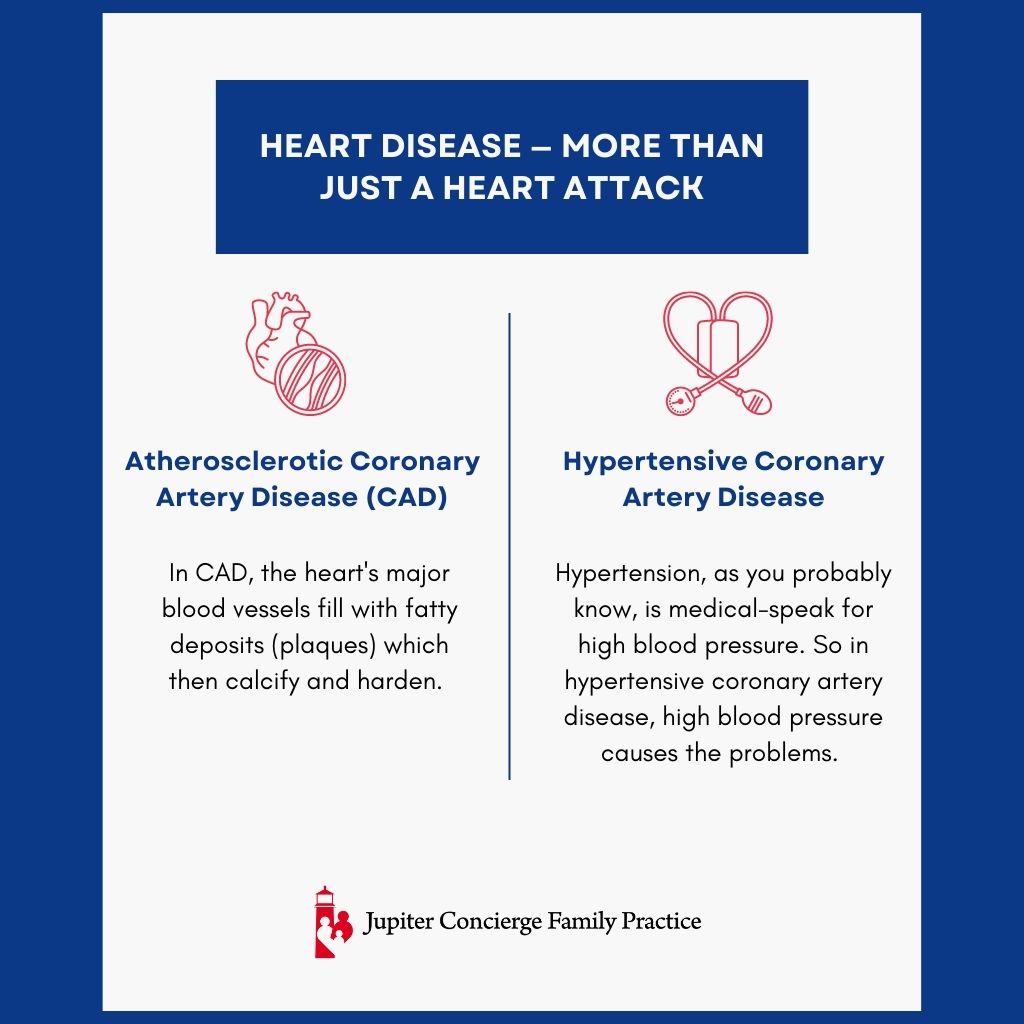
Heart disease is the leading cause of death in the United States, claiming around 659,000 lives each year. To put that into perspective, that’s one death from heart disease every 48 seconds, as of 2021.
By the time you finish this article — about a four-minute read — five people will have died from heart disease, with a sixth not far behind.
The good news is, heart disease is largely preventable. Different people have varying risk factors. Things like age, race, gender, ethnicity, and family history (or genetics) are all factors. Today we’ll focus on one main factor: a family history of heart disease.
Heart Disease — More Than Just a Heart Attack
When we say “heart disease,” most people think of heart attacks, but a heart attack is only one aspect of heart disease. Let’s take a look at two major types of heart disease and what they mean:
- Atherosclerotic Coronary Artery Disease (CAD) is a buildup of plaque in the heart’s arteries. The term “atherosclerosis” refers to the particulars of the disease process in this form of heart disease. In CAD, the heart’s major blood vessels fill with fatty deposits (plaques) which then calcify and harden.You can imagine this is not at all desirable. When these deposits fill the arteries, they restrict blood flow to the heart and eventually lead to a heart attack.
- Hypertensive Coronary Artery Disease. As in the case with atherosclerotic CAD, this is a disease of the heart’s major blood vessels. Hypertension, as you probably know, is medical-speak for high blood pressure. So in hypertensive coronary artery disease, high blood pressure causes the problems.Hypertension can result in what’s known as end organ damage. In other words, high blood pressure can damage organs anywhere in the body, including the heart, brain, and kidneys.
A Family History of Heart Disease
Everyone’s family has some sort of genetic predisposition to contend with. The good news about heart disease is that many people won’t need genetic testing to discover whether they’re at risk. They can simply look to their family tree.
If you don’t know your family history well, asking family members if they know of close relatives who died of a heart attack is a good place to start. You’re looking for premature heart disease as an indicator of family history, meaning the condition appeared before the age of 60.
In addition to information about your biological family’s medical history, genetic tests can be done, such as lipoprotein(a), which is a marker of genetic predisposition for heart disease.
The thing is, genetics are not the only risk factor for heart disease. You saw the statistics at the beginning of this post. They’re staggering. So regardless of whether you have a family history of heart disease, it’s important to take other risk factors into account and undergo periodic screening.
Other risk factors to watch for include:
- Diabetes, pre-diabetes, or any other kind of glucose intolerance
- High blood pressure
- Cholesterol levels — including both the “good” HDL and the “bad” LDL, and triglycerides
- Body fat percentage
Besides evaluating for the above factors and looking for a family history of heart disease, physicians may also perform some basic screening tests. In my office, for example, every patient gets a Skin Carotenoid Score to evaluate the level of oxidative stress in their bodies. If it shows a high level, which indicates an elevated risk for heart disease, then I know we need to investigate further.
Additional conventional tests might include an EKG, a coronary calcium score, a stress test, or an echocardiogram. In functional medicine, we look a bit further into other risk factors associated with heart disease by testing for:
- Vitamin D levels
- Lipid peroxide levels
- Inflammation markers
- Arginine deficiency
- Omega-3 and omega-6 fatty acid levels
- Organic acid levels
These tests inform us about factors, like blood vessel health and your metabolism of fats, carbohydrates, and proteins.
In every one of our patients, we follow the evidence and get them the screening they need. And if someone has a family history of heart disease, we know to pay extra attention to monitoring their cardiac health.
We always start with the least invasive, lowest-risk tests first. Then, if needed, we proceed to more involved testing.
What if You Have Heart Disease?
Let’s say you have a family history of heart disease, and after undergoing a panel of tests, you discover you have some indicators of heart disease as well. Your physician will then give you custom recommendations for your situation.
Lifestyle changes. Across the board, cardiac patients can benefit from lifestyle changes. These will include obvious behavior changes like quitting smoking and reducing alcohol intake.
Diet and exercise modifications are also beneficial and can actually be a lot of fun. It’s energizing and exciting to experiment with new foods and different forms of movement. And you don’t have to go at it alone. The functional medicine tests mentioned in the previous section can help guide your nutritional needs in a more focused manner. Working with a functional nutritionist can be extremely helpful.
Another lifestyle change to add into your repertoire is stress elimination. Stress is a major factor in heart disease. Some level of stress is inescapable, but we can learn to avoid some exposure and to stop carrying it around. Breathing exercises, visualizations, and meditations are all powerful stress-busters.
Drugs and procedures. Your doctor may also recommend pharmaceutical interventions, such as a blood pressure or cholesterol medication. Depending on the severity of your situation, you may be a candidate for surgery, such as a coronary bypass or an angioplasty.
Bottom Line
Knowing the reality of your heart health is the first step to taking care of yourself for a long and full life. One of the easiest pieces of information you can collect in evaluating your risk is finding out your family history of heart disease. From there, you and your physician can evaluate what lifestyle choices are best suited to keeping your heart beating for the long haul.

Dr. David Rosenberg
Dr. Rosenberg is a board-certified Family Physician who obtained a BS in Chemistry at Georgia's Mercer University in 1983 and a medical degree from the University of Miami in 1988. He completed his residency in Family Medicine at The Washington Hospital in Washington, Pennsylvania, in 1991 and then practiced Emergency Medicine at Palm Beach Gardens Medical Center for two years. In 1993 he started private practice in Jupiter.
Dr. Rosenberg has been married to his wife Mary for 38 years and they have three grown children together. Some of his interests include being a huge baseball fan, sailing, snow skiing, self-development, and learning to play piano.

